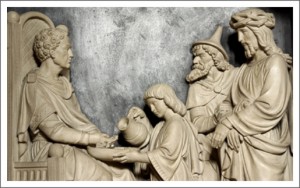Relevance Without Compromise
Rev. Tony Cooke
These are notes to a message that Tony shared with a group of pastors at a conference in Pittsburgh in February of 2003. To order a copy of the CD, please Click Here.
1. THEY SPEAK WITH OTHER TONGUES (A Humorous Look at Witnessing) By Bob Cohen
“Have you ever been saved?” A rather wide-eyed young fellow startled me with his question as we waited for the bus. He handed me a booklet with a picture of hell on the front. “Sure,” I responded. “Once when I was nine years old I was swimming at Jones Beach on Long Island, and a strong undertow began to drag me out to sea. My uncle heard my call for help and ….” “No, no,” he interrupted, “Redeemed! Have you ever been redeemed? You know, reborn … washed in the blood?” “What,” I inquired, “in the world are you talking about?” “Convicted. Have you ever felt convicted?” “No, of course not!” I replied. “I’ve never been in trouble with the law.” He looked at me square in the eye. “I think you need to be delivered.” “Delivered? I was just waiting for the bus home. I think I’ll stick with that, but thank you very much.” He looked at me as if I were speaking another language. “Can we have lunch together sometime?” he asked. “I work just down the street.” “Sure, that would be fine.” He looked harmless enough, but I must admit he was an unusual fellow and quite difficult to understand.
That Wednesday I had lunch with Ed. He was a little late but explained that he was having some quiet time. “Quiet time?” I asked. “What do you mean?” “Each day just before lunch I have some time in my prayer closet,” he responded. I was puzzled. “Do you pray in a closet at work?” “No,” he answered. “It’s in my car.” “A closet in your car?!” He changed the subject. Like the first day I met him, again he left me confused. This Ed is quite a unique fellow, I thought.
As we parted that day, Ed gave me a little booklet that explained how someone could come into a relationship with God through Jesus Christ. I read it and understood it and knew that was exactly what I needed. That night I submitted my life to Jesus, and I was “born again” as it stated in the booklet. Two days later I told Ed. He was overjoyed.
The following week we got together again, and Ed strongly urged me to find a good body. I was surprised at his suggestion, but it sounded good to me. I took his advice and proceeded to comb the local health clubs for an attractive woman. When I met Denise, I knew she was the one. We began to date and soon she became a believer, too. Ed rejoiced and told us that it was crucial that we get planted so that we could grow together.
“Sometimes it’s hard to understand this guy,” I confided to Denise. I told Ed that I wasn’t quite sure what he meant by planted. He responded, “Committed! You both need to be committed now that you know Jesus.” ” Now wait a minute,” I protested. “Just because I don’t understand what planted means doesn’t mean I’m nuts. Anyway, I think that trusting Jesus is the most sane thing that I’ve ever done in my life.”
It was obvious that Ed’s patience was growing thin. He explained, “Bob and Denise, you have to get plugged in. Don’t you understand?” No we didn’t! But I did wonder if getting plugged in had any connection with “going out under the power,” something that I had heard Ed mention but hoped it would never happen to me.
Regretfully, I had to miss worship the next Sunday. But Ed and I had breakfast together Monday morning, and he filled me in on what happened. “God moved!” he said with excitement. “God really moved yesterday!” “Where is he now?” I pleaded. I was just getting to know Him, and now He’s gone?” “No, no, Bob, God hasn’t gone anywhere.” I was relieved. “It’s just that so many people were stepping out and moving in the gifts.” “You mean people were leaving during the meeting?” I asked. “And what’s this about presents?” ” No, it’s the gifts. The gifts were really flowing,” he said. “That’s beautiful,” I answered. “People were giving gifts to each other. I wish I was there.” Now Ed seemed confused.
“Anyway,” he said, changing the subject, “Denise was there, and boy, was she on fire.” “Fire? Denise got burned? What happened? Is she O.K.?” “No, Bob, you don’t understand.” (That sure is an understatement, I thought.) “Denise is just fine. It’s just that I believe she is really called, and that God wants to use her.” Things were not getting clearer. “Did Denise mention that she’s getting too many phone calls or something? And what’s this about God wanting to take advantage of her?” I asked. Ed sighed, “Can I walk in the light with you?” “Where do you want to go?” I answered. “Of course we can walk in the light. It’s daytime, Ed.” He just shook his head. I don’t know what it is, but sometimes it seems that Ed and I have a hard time communicating.
It’s been two years since I was saved and delivered. Now I’m plugged in, planted, and committed to a good body. God has been moving, and I’ve been stepping out in the gifts. I can hardly believe how God has been using me! I have developed one new problem, though. It seems that all my old friends just don’t understand me anymore. When I share about my redemption, that I’ve been washed as white as snow, and that I desire to follow the Lamb, they seem to tune me right out. I guess they’re just convicted when they see that I’m on fire.
2. RELEVANCE & COMPROMISE DEFINED
Relevant:
* relating to, or bearing upon the matter at hand
* connected with what is happening or being discussed
* correct or suitable for a particular purpose
* important, useful
* implies a traceable, significant, logical connection
* pertinent, applicable
Compromise:
* (to reach) an agreement in an argument in which the people involved reduce their demands or change their opinion in order to agree
* to allow (your principles) to be weakened or (your standards or morals) to be lowered
* an agreement reached by mutual concession
* to modify one’s opinions, demands, etc.
* to bring into disrepute or danger by indiscretion
* give and take
* to concede a point
* to make concessions
* something that combines qualities or elements of different things
3. SCRIPTURES, QUOTES, & PRINCIPLES PROMOTING THE CONCEPT OF “NO COMPROMISE”
John 12:42-43
42 Nevertheless even among the rulers many believed in Him, but because of the Pharisees they did not confess Him, lest they should be put out of the synagogue;43 for they loved the praise of men more than the praise of God.
Acts 20:20-21, 26-27
20 how I kept back nothing that was helpful, but proclaimed it to you, and taught you publicly and from house to house,21 testifying to Jews, and also to Greeks, repentance toward God and faith toward our Lord Jesus Christ.
26 Therefore I testify to you this day that I am innocent of the blood of all men.27 For I have not shunned to declare to you the whole counsel of God.
Romans 1:16-17
16 For I am not ashamed of the gospel of Christ, for it is the power of God to salvation for everyone who believes, for the Jew first and also for the Greek.17 For in it the righteousness of God is revealed from faith to faith; as it is written, “The just shall live by faith.”
1 Corinthians 1:23-25
23 but we preach Christ crucified, to the Jews a stumbling block and to the Greeks foolishness,24 but to those who are called, both Jews and Greeks, Christ the power of God and the wisdom of God.
1 Corinthians 2:1-5
1 And I, brethren, when I came to you, did not come with excellence of speech or of wisdom declaring to you the testimony of God.2 For I determined not to know anything among you except Jesus Christ and Him crucified.3 I was with you in weakness, in fear, and in much trembling.4 And my speech and my preaching were not with persuasive words of human wisdom, but in demonstration of the Spirit and of power,5 that your faith should not be in the wisdom of men but in the power of God.
Galatians 1:10
10 For do I now persuade men, or God? Or do I seek to please men? For if I still pleased men, I would not be a bondservant of Christ.
Galatians 5:11
11 …the offense of the cross…
Colossians 3:22
22 Bondservants, obey in all things your masters according to the flesh, not with eyeservice, as men-pleasers, but in sincerity of heart, fearing God.
1 Thessalonians 2:4
4 But as we have been approved by God to be entrusted with the gospel, even so we speak, not as pleasing men, but God who tests our hearts.
2 Timothy 4:1-4
1 I charge you therefore before God and the Lord Jesus Christ, who will judge the living and the dead at His appearing and His kingdom:2 Preach the word! Be ready in season and out of season. Convince, rebuke, exhort, with all longsuffering and teaching.3 For the time will come when they will not endure sound doctrine, but according to their own desires, because they have itching ears, they will heap up for themselves teachers;4 and they will turn their ears away from the truth, and be turned aside to fables.
“A vacillating unbeliever has no respect for the man who lacks the courage to preach what he believes.”
– Billy Graham
“The pulpits of the great cities in Christendom are filled largely by two classes of men – critics who believe too little to preach and men who fear the critics too much to preach.”
– Warren Akin Chandler
“Compromise is always wrong when it means sacrificing principle.”
– Drake Raft
“Everywhere there is apathy. Nobody cares whether that which is preached is true or false. A sermon is a sermon whatever the subject; only the shorter it is the better.”
– Charles Haddon Spurgeon
“Where the gospel is fully and powerfully preached, with the Holy Ghost sent down from heaven, our churches do not only hold their own, but win converts; but when that which constitutes their strength is gone—we mean when the gospel is concealed, and the life of prayer is slighted—the whole thing becomes a mere form and fiction. For this thing our heart is sore grieved.”
– Charles Haddon Spurgeon
“Our Lord attracted sinners because He was different. They drew near to Him because they felt that there was something different about Him… And the world expects us to be different. The idea that we are going to win people to the Christian faith by showing them that after all you are remarkably like them, is theologically and psychologically a profound blunder.”
– Martyn Lloyd-Jones
“Marketing principles are becoming the arbiter of truth. Elements of the message that don’t fit the promotional plan are simply omitted. Marketing savvy demands that the offense of the cross must be downplayed. Salesmanship requires that negative subjects like divine wrath be avoided. Consumer satisfaction means that the standard of righteousness cannot be raised too high. The seeds of a watered-down gospel are thus sown in the very philosophy that drives many ministries today.”
“In show business, truth is irrelevant; what really matters is whether we are entertained. Substance counts for very little; style is everything.”
– John MacArthur Jr., Ashamed of the Gospel – When the Church Becomes Like the World.
“Biblical preaching was God-centered, sin-exposing, self convicting and life-challenging—the direct opposite of today’s light, informal sermons that Christianize self-help and entertain better than they convict.
There are so many illustrations in today’s market sensitive sermons that the hearer forgets the biblical truth that is being illustrated; so many personal anecdotes that the hearer knows the pastor better than she knows Christ; so many human-interest stories that listening to the sermon is easier than reading the Sunday paper; so practical that there is hardly anything to practice.
No wonder nominal Christians leave church feeling upbeat. Their self-esteem is safely intact. Their minds and hearts have been sparked and soothed with sound-bite theology, Christian maxims, and a few practical pointers dealing with self-esteem, kids or work. But the question remains: has the Word of God been effectively and faithfully proclaimed, penetrating comfort zones and the veneer of self-satisfaction with the truth of Jesus Christ?”
– Dr. Douglas D. Webster, Selling Jesus: What’s Wrong with Marketing the Church.
“The faith-world of John Wesley, Jonathon Edwards, John Jay, William Wilberforce, Hannah Moore, Lord Shaftesbury, Catherine Booth, Hudson Taylor, D.L. Moody, Charles Spurgeon, Oswald Chambers, Andrew Murray, Carl Henry, and John Stott is disappearing. In its place a new evangelicalism is arriving in which therapeutic self-concern overshadows knowing God, spirituality displaces theology, end-times escapism crowds out day-to-day discipleship, marketing triumphs over mission, references to opinion polls outweigh reliance upon biblical exposition, concerns for power and relevance are more obvious than concern for piety and faithfulness, talk of reinventing the church has replaced prayer for revival, and the characteristic evangelical passion for missionary enterprise is overpowered by the all-consuming drive to sustain the multiple business empires of the booming evangelical subculture.”
– Os Guiness, Prophetic Untimeliness – A Challenge to the Idol of Relevance. Baker. 2003.
4. SCRIPTURES, QUOTES, & PRINCIPLES PROMOTING THE CONCEPT OF “RELEVANCE”
1 Corinthians 9:19-23 (TLB)
19 …I am not bound to obey anyone just because he pays my salary; yet I have freely and happily become a servant of any and all so that I can win them to Christ. 20 When I am with the Jews I seem as one of them so that they will listen to the Gospel and I can win them to Christ. When I am with Gentiles who follow Jewish customs and ceremonies I don’t argue, even though I don’t agree, because I want to help them. 21 When with the heathen I agree with them as much as I can, except of course that I must always do what is right as a Christian. And so, by agreeing, I can win their confidence and help them too. 22 When I am with those whose consciences bother them easily, I don’t act as though I know it all and don’t say they are foolish; the result is that they are willing to let me help them. Yes, whatever a person is like, I try to find common ground with him so that he will let me tell him about Christ and let Christ save him. 23 I do this to get the Gospel to them and also for the blessing I myself receive when I see them come to Christ.
1 Corinthians 10:31-33
31 Therefore, whether you eat or drink, or whatever you do, do all to the glory of God.32 Give no offense, either to the Jews or to the Greeks or to the church of God,33 just as I also please all men in all things, not seeking my own profit, but the profit of many, that they may be saved.
1 Corinthians 14:7-9
7 Even things without life, whether flute or harp, when they make a sound, unless they make a distinction in the sounds, how will it be known what is piped or played?8 For if the trumpet makes an uncertain sound, who will prepare for battle?9 So likewise you, unless you utter by the tongue words easy to understand, how will it be known what is spoken? For you will be speaking into the air.
2 Corinthians 5:13-14
13 For if we are beside ourselves, it is for God; or if we are of sound mind, it is for you.14 For the love of Christ compels us…
“Unless the gospel is preached with contemporary relevance it has not been preached.”
– Martin Luther
“The men in the Lewis and Clark expedition thought of themselves as explorers, not a war party. This has to be out attitude toward contemporary culture – we are not at war with them; we are explorers looking for the initiation of God’s kingdom in the culture, so we can come alongside it as ambassadors of His kingdom and partner with Him.”
– Todd Hunter (quoted in Explorer, July 17, 2000)
5. BLENDING “NO COMPROMISE” AND RELEVANCE – THEY ARE NOT CONTRADICTORY!
“In matters of style, swim with the current. In matters of principle, stand like a rock.”
– Thomas Jefferson
“In essentials, unity.
In non-essentials, liberty.
In all things, charity.”
– Pascal
These showed “seeker sensitivity” without compromise…
Ezra and his fellow priests – Nehemiah 8:8 – So they read distinctly from the book, in the Law of God; and they gave the sense, and helped them to understand the reading.
John the Baptist – (Luke 3:10-14) He gave the people, especially those that inquired—tax collectors and soldiers—specific instructions about how to implement the uncompromised message that he was preaching.
Jesus – The Incarnation is the greatest example of adaptability that has ever taken place. He was the Word made flesh. Jesus never dealt with any two individuals exactly the same way. The substance of His message, in the final analysis, was always the same: “Believe in Me.” However, the style varied from Nicodemus to the Woman at the Well. His technique was different in reaching out to the Woman at the Well than it was in communicating to the Rich Young Ruler.
Paul – Paul exhibited relevance without compromise when he spoke to the Athenians in Acts 17. He did not speak of the God of Abraham, Isaac, and Jacob, but of the “God in whom we live, move, and have our being.” He also quoted one of their own poets, not one of the Jewish prophets (Acts 17:28). His presentation exhibited traits of adaptation, but not compromise. The people learned of judgment, Jesus, and the resurrection.
In 1 Corinthians 14, Paul provided guidelines for the proper usage of spiritual gifts so that the uninformed and unbelievers would not be alienated and repelled.
Those Who Translated Scripture into the Language of the People:
“I wish that the Scriptures might be translated into all languages, so that not only the Scots and the Irish, but also the Turk and the Saracen might read and understand them. I long that the farm-laboring might sing them as he follows his plough, the weaver hum them to the tune of his shuttle, the traveler beguile the weariness of his journey with their stories.” Erasmus of Rotterdam (1467-1536), from Eerdman’s Handbook to the History of Chrisitanity, page 359.
In a heated debate with church authorities in 1522, William Tyndale said, “If God spare my life, ‘ere many years I will cause the boy that driveth the plough to know more Scripture than thou dost.” Tyndale was a the greatest Greek scholar in England, but his success was not simply based on his scholarship, but on his “his ability to use the expressions of the English people.”
“The Fire of Devotion – the History of the English Bible.” Dr. John R. Hellstern and Dr. Donald L. Brake Sr., page 9.
6. Rev. Kenneth E. Hagin said the following in his book, Plans, Purposes, and Pursuits (Faith Library Publications).
Then He [Jesus] spoke to me about different kinds of meetings – believers’ meetings, evangelistic meetings, healing meetings, teaching meetings, prayer meetings, worship services, and so forth.
He said, ‘Where you are missing it today in your culture in the United States is, you try to put all those kinds of meetings into one service, and so you never really reach the full potential of any meeting.’
Sometimes in a campmeeting-type setting, we have to combine many different kinds of services. However, people in a church setting often try to have constant campmeeting, or all crusade-type services. You can’t have campmeeting all the time. In order for people to get a balanced spiritual diet, they need all kinds of meetings. When we try to have all kinds of meetings in one, none of them are as successful as they should be. (Pages 41-42)
If I were a pastor again, at certain times I’d have believers’ meetings. These meetings would not be for the general public. Things can happen in a meeting when just believers are present that should not happen in a meeting open to the general public. But if anyone else happened to come in, they would get saved…and they would encounter the Presence of God just as 1 Corinthians 14 says.
We called our Sunday morning services in Farmersville, believers’ meetings, because no one came except Christians.
On Sunday nights, though, visitors came and filled up the building. They even stood outside looking in the doors! We’d have more sinners than saints at those Sunday night meetings.
I would say to our congregation ahead of time, ‘We’re coming tonight with the sinner in mind. We’re not coming to worship God or to get blessed ourselves. We got blessed this morning. This isn’t a believer’s meeting. Some things which happened this morning would be out of order tonight. This is an evangelistic meeting. We’re not interested in jumping and shouting, but we’re interested in helping that unsaved one along.’ (Page 49)
Consider also what Smith Wigglesworth said about certain types of public manifestations:
The Lord will allow you to be very drunk in His presence, but sober among people. I like to see people so filled with the Spirit that they are drunk like the 120 on the Day of Pentecost, but I don’t like to see people drunk in the wrong place. That is what troubles us, somebody being drunk in a place of worship where a lot of people come in that know nothing about the Word. If you allow yourself to be drunk there, you send people away; they look at you instead of seeing God. They condemn the whole thing because you have not been sober at the right time. Paul writes, “For whether we be beside ourselves, it is to God: or whether we be sober, it is for your cause” (2 Corinthians 5:13). You can be beside yourself. You can go a bit further than being drunk. You can dance, if you will do it at the right time. So many things are commendable when all the people are in the Spirit. Many things are foolish about you when you are not in the Spirit. We must be careful not to have a good time at the expense of somebody else. When you have a good time you must see that the spiritual conditions in the place lend themselves to help you and that the people are falling in line with you. Then you will find it always a blessing. (Ever Increasing Faith, by Smith Wigglesworth. Gospel Publishing House, 1971. Pages 122-123.)
7. There are issues that every pastor must resolve as he establishes his approach to ministry:
* The Negotiable vs. the Non-negotiable
* Adaptability vs. Compromise
* Flexibility vs. Rigidity
* Principle vs. Preference
* Substance vs. Style
* Inclusivism vs. Exclusivism
8. Seven Areas We Must Examine
The message you minister, as well as the philosophy and style of ministry you embrace, is something that you must determine. The following questions are not designed to dictate an answer for you, but rather, to help you process and work through the issues at hand.
* What are my motives in ministry? Am I pursuing, above all else, the glory of God and the benefit of those to whom I minister? Does the fear of man, a desire for popularity, approval, or acceptance cause me to shrink back from any aspect of my assignment as a minister?
* Am I making a clear presentation of the gospel through my ministry? Do people have opportunity to receive a clear and thorough understanding of the claims of Christ and the teachings of the Bible through my ministry?
* Paul said, “I am not ashamed of the gospel of Christ (Romans 1:16),” and “I am innocent of the blood of all men. For I have not shunned to declare to you the whole counsel of God (Acts 20:26-27).” Can I say the same – that I am not ashamed of the gospel, and that I am declaring the whole counsel of God?
* Jesus and Paul were both aware that their respective audiences had certain limitations in their ability to receive, and they calibrated what they ministered accordingly (John 16:12; 1 Corinthians 3:2). However, provision, opportunity, and encouragement was always present for those believers to move deeper into the things of God and to move into maturity (Hebrews 5:12 – 6:13). Am I properly calibrating my message to my audience, and concurrently providing the appropriate mechanism(s) for those who are prepared to move deeper into the things of God? Also, if my focus is toward a more spiritually mature audience, is there a mechanism in place to provide appropriate ministry for the lost and to spiritual babes?
* Am I trying to minister to such a wide spectrum of people in each service that I am not achieving maximum effectiveness toward anyone? Do I need to provide more distinction as to the purpose of various types of services? Do we need to have greater clarity in establishing certain types of meetings, such as evangelistic services, believers’ meetings, etc.? Are people in my church aware of the different purposes for various types of services? Have I modeled and taught my people how to operate in the things of the Spirit “decently and in order (1 Corinthians 14:40)?”
* Am I diligently and prayerfully seeking to incorporate both concepts—”no compromise” and “relevance”—into my ministry? While trying to make our churches outreach-oriented, have we stifled the Holy Spirit? In trying to be free and expressive concerning manifestations of the Holy Spirit, have we sometimes repelled unbelievers and alienated the uninformed from us, leaving them with the impression that we are crazy (1 Corinthians 14:11, 23)? (Note: Those who hold to a staunch “no compromise” position would not say that we should be insensitive to or unfriendly toward seekers. Neither would those who advocate seeker-friendly or seeker-sensitive approaches say that the gospel should be compromised. This is not an either/or issue.)
* Am I threatened by others whose style, approach, methods, and emphases are different than mine? Do I feel insecure, invalidated, or pressured to conform to and imitate others? Do I feel the need to condemn others who have a different style or methodology than my own? Do I feel that others need to be a clone—a carbon-copy of my own style—in order for them to have a valid ministry? Am I comfortable with the idea that another minister may have an entirely different assignment or thrust than what I have—that each minister may have a different personality, gifting, anointing, style, methodology, approach, and even a unique target audience from what I have?
9. A pastor friend of mine who believes in the manifestations of the Holy Spirit encountered a problem in his church with the way in which a certain person was endeavoring to operate. Having shared the incident with me, I asked him to put it in written form so others could consider how he handled the situation.
Dear Tony,
One Sunday morning at the end of praise and worship one of our “regular attendees,” not a church member, gave a rather earsplitting, intense tongue. After which I gave the interpretation, which was a challenging word, but not as fierce as the tongue. The delivery of the tongue was unnerving to our mature members and quite terrifying to our guests, none which returned to our church. We had been developing relationships with some of these guests over a period of weeks and months. Our one shot at winning them to the church was ruined with one supposed manifestation of the Holy Spirit.
Several weeks passed before the same man once again delivered the same earsplitting, intense sort of tongue, followed by an earsplitting, intense interpretation of the love and mercy of God. The delivery and message were quite contradictory. The incident had the same effect on our guests, none returned. It is not unusual for us to have guests who enjoy our church and return and become members within a few months.
Following this tongue and interpretation, even long-standing church members were confused and upset. The delivery of the tongue would scare the wits out of a person. People wondered why God was yelling at us. Visitors thought us to be crazy.
I called the man into my office and asked him to soften his tone. I appreciated his boldness and obedience to the Spirit, but could he soften the delivery? Actually, he is a rather gentle man, but his Pentecostal tradition conditioned him in only one way of operating in the Spirit. His message was, in my opinion, correct, his timing appropriate; yet, his tone was too severe. I consulted with other spiritual leaders of the congregation. Their ruling was the same as mine. We judged him out of line, unless he softened his tone. We suggested him coming to the stage to be acknowledged and to use a microphone. His response was, “This is the way the Holy Ghost gives it to me, this is the way I must give it.” I told him that he was out of order, and was no longer free to give a tongue or prophecy, if he would not yield to the church leaders.
He and several family members left the church. They accused us of grieving and stifling the Holy Spirit. The result, however, is that we continue to have an occasional tongue & interpretation and prophecy, without scaring the wits out of our guests and members.
I also spent a Wednesday night service explaining to the church our decision about these incidents, and the Scriptural basis of our decision. The teaching brought great reassurance to the members that we are a Holy Spirit church, operating decently and in order. Demonstrations of the Spirit which bring confusion, fear and frustration cannot be tolerated in the church. Prophecy (or any demonstration) should bring edification, exhortation and comfort to people (1 Corinthians 14.3-4). An outsider, or unbeliever should not come in to our services and conclude that we are crazy. The proper demonstrations of the Holy Spirit bring conviction and revelation to outsiders and unbelievers (1 Corinthians 14.23-25).
 The story of Pontius Pilate is most fascinating. As the Roman Governor of Judea, he found himself thrust into a situation he could have never imagined. The religious elite of his country came to him, vehemently demanding the crucifixion of one they claimed to be a horrible criminal.
The story of Pontius Pilate is most fascinating. As the Roman Governor of Judea, he found himself thrust into a situation he could have never imagined. The religious elite of his country came to him, vehemently demanding the crucifixion of one they claimed to be a horrible criminal. Shortly before Pilate called for a basin, Jesus had taken another basin and used it for a far more godly purpose. We read about this in John’s account of the Last Supper.
Shortly before Pilate called for a basin, Jesus had taken another basin and used it for a far more godly purpose. We read about this in John’s account of the Last Supper.
 A soft answer turns away wrath, But a harsh word stirs up anger. The tongue of the wise uses knowledge rightly, But the mouth of fools pours forth foolishness. Proverbs 15:1-2
A soft answer turns away wrath, But a harsh word stirs up anger. The tongue of the wise uses knowledge rightly, But the mouth of fools pours forth foolishness. Proverbs 15:1-2 Everyone’s trying to make it in life, aren’t they?
Everyone’s trying to make it in life, aren’t they? At the end of two WWII movies, Tora! Tora! Tora! (1970) and Pearl Harbor (2001), Isoroku Yamamoto, Admiral of the Japanese fleet, says of the attack, “I fear all we have done is to awaken a sleeping giant and fill him with a terrible resolve.” History bears out that his concern was well-founded.
At the end of two WWII movies, Tora! Tora! Tora! (1970) and Pearl Harbor (2001), Isoroku Yamamoto, Admiral of the Japanese fleet, says of the attack, “I fear all we have done is to awaken a sleeping giant and fill him with a terrible resolve.” History bears out that his concern was well-founded. Last month, we introduced the topic of “Shallow Faith” and presented some of the myths about spiritual maturity. In particular, we identified three factors that don’t automatically or necessarily make a person spiritually mature. They are: Time (having been saved a certain amount of time), Proximity (having been around church or spiritually mature people), and Appearance (having an outward form or look of spirituality).
Last month, we introduced the topic of “Shallow Faith” and presented some of the myths about spiritual maturity. In particular, we identified three factors that don’t automatically or necessarily make a person spiritually mature. They are: Time (having been saved a certain amount of time), Proximity (having been around church or spiritually mature people), and Appearance (having an outward form or look of spirituality). “A Shepherd’s Heart” is a term you’ll hear used from time to time, and what a beautiful expression it is. One of the most frequently used images in the early church was that of a shepherd with a lamb. I took the above picture at an exhibit that was set up in the Flavian Amphitheater (the Colosseum) while visiting Rome.
“A Shepherd’s Heart” is a term you’ll hear used from time to time, and what a beautiful expression it is. One of the most frequently used images in the early church was that of a shepherd with a lamb. I took the above picture at an exhibit that was set up in the Flavian Amphitheater (the Colosseum) while visiting Rome.  I often hear spiritual leaders express concern about the lack of depth in peoples’ faith. Shallow Christianity is marked by the five C’s.
I often hear spiritual leaders express concern about the lack of depth in peoples’ faith. Shallow Christianity is marked by the five C’s. One of the most common statements I hear from pastors pertains to the need for workers—for committed, reliable, and consistent volunteers. Every pastor’s dream is to have an overflowing army of eager, joyful volunteers. When I think of this, I am reminded of David’s words: “Your people will volunteer freely in the day of Your power” (Psalm 110:3 NASB).
One of the most common statements I hear from pastors pertains to the need for workers—for committed, reliable, and consistent volunteers. Every pastor’s dream is to have an overflowing army of eager, joyful volunteers. When I think of this, I am reminded of David’s words: “Your people will volunteer freely in the day of Your power” (Psalm 110:3 NASB).
 This article presents seven simple thoughts on prayer, and then shares insights from different individuals. I didn’t feel that a lot of explanation or amplification was needed on these.
This article presents seven simple thoughts on prayer, and then shares insights from different individuals. I didn’t feel that a lot of explanation or amplification was needed on these. We’ve all seen these initials. When you receive an invitation to a wedding or to some other type of formal event, these initials will likely be on the card. RSVP is derived from the French expression répondez s’il vous plaît, which means “Please Respond.” To honor such a request and to let the host know whether or not you are coming is a simple courtesy that allows an event planner to know how to prepare.
We’ve all seen these initials. When you receive an invitation to a wedding or to some other type of formal event, these initials will likely be on the card. RSVP is derived from the French expression répondez s’il vous plaît, which means “Please Respond.” To honor such a request and to let the host know whether or not you are coming is a simple courtesy that allows an event planner to know how to prepare. Throughout history, God raised up various deliverers to get His people Israel out of bondage and other difficult situations. These deliverers experienced various levels of success, but the effect of their efforts was always limited and temporal. Many times a deliverer would be used by God to get Israel out of difficulty, and shortly the people would forget God and get into trouble again. God would then raise up yet another deliverer. Of course, Jesus came as the Ultimate Deliverer who came to save not only the nation of Israel, but all of humanity from the penalty and power of sin.
Throughout history, God raised up various deliverers to get His people Israel out of bondage and other difficult situations. These deliverers experienced various levels of success, but the effect of their efforts was always limited and temporal. Many times a deliverer would be used by God to get Israel out of difficulty, and shortly the people would forget God and get into trouble again. God would then raise up yet another deliverer. Of course, Jesus came as the Ultimate Deliverer who came to save not only the nation of Israel, but all of humanity from the penalty and power of sin. Like many people, I have a tendency to skim over lists of names in the Bible. Some time ago, though, I began wondering about the names of the rivers that flowed out of the Garden of Eden. Genesis 2:10-14 tells us that a river went out of Eden to water the garden, and that it parted and became four rivers: the Pishon, Gihon, Hiddekel, and Euphrates.
Like many people, I have a tendency to skim over lists of names in the Bible. Some time ago, though, I began wondering about the names of the rivers that flowed out of the Garden of Eden. Genesis 2:10-14 tells us that a river went out of Eden to water the garden, and that it parted and became four rivers: the Pishon, Gihon, Hiddekel, and Euphrates. There are two particular usages of the word “quench” in Paul’s writings that are very important in our walk with God.
There are two particular usages of the word “quench” in Paul’s writings that are very important in our walk with God.
 Psalm 34:19 says, “Many are the afflictions of the righteous, but the LORD delivers him out of them all.”
Psalm 34:19 says, “Many are the afflictions of the righteous, but the LORD delivers him out of them all.”  According to today’s politically correct and tolerant society, the last thing in the world a Christian should ever do is to state or imply that one person’s religion is better than another’s. We are supposed to embrace the idea that all religious expressions are equal and that all roads ultimately lead to the same destination. Fortunately, it appears that the Apostle James missed being “enlightened” by these perspectives, and he delineated sharply between religion that is “useless” and religion that is “pure and undefiled.” He said:
According to today’s politically correct and tolerant society, the last thing in the world a Christian should ever do is to state or imply that one person’s religion is better than another’s. We are supposed to embrace the idea that all religious expressions are equal and that all roads ultimately lead to the same destination. Fortunately, it appears that the Apostle James missed being “enlightened” by these perspectives, and he delineated sharply between religion that is “useless” and religion that is “pure and undefiled.” He said: The following article is excerpted from the upcoming book, “Qualified: Serving God with Integrity and Finishing Your Course with Honor.” It will be released no later than July, but you can
The following article is excerpted from the upcoming book, “Qualified: Serving God with Integrity and Finishing Your Course with Honor.” It will be released no later than July, but you can  Spiritual leaders must be aware of and guard themselves against the intoxicating and devastating influence of pride, especially when experiencing success. Pride is insidious. It deceives the one infected, causing him to think "more" of himself, and "less" of God.
Spiritual leaders must be aware of and guard themselves against the intoxicating and devastating influence of pride, especially when experiencing success. Pride is insidious. It deceives the one infected, causing him to think "more" of himself, and "less" of God. One of the reasons that Lisa and I love sharing the Word of God around the world is because it is the truth of His Word that changes lives. When people come to the knowledge of His Word, they are acquiring the tools and skills necessary to experience transformation in their lives.
One of the reasons that Lisa and I love sharing the Word of God around the world is because it is the truth of His Word that changes lives. When people come to the knowledge of His Word, they are acquiring the tools and skills necessary to experience transformation in their lives. Having grown up in a mainline denominational church, I was used to hearing about the Trinity. Every Sunday as church was being dismissed, we sang the Doxology, which ended with the admonition, "Praise Father, Son, and Holy Ghost." After decades of studying the Scripture, I am more impressed than ever before with the majestic and harmonious working of the members of the Trinity.
Having grown up in a mainline denominational church, I was used to hearing about the Trinity. Every Sunday as church was being dismissed, we sang the Doxology, which ended with the admonition, "Praise Father, Son, and Holy Ghost." After decades of studying the Scripture, I am more impressed than ever before with the majestic and harmonious working of the members of the Trinity. 